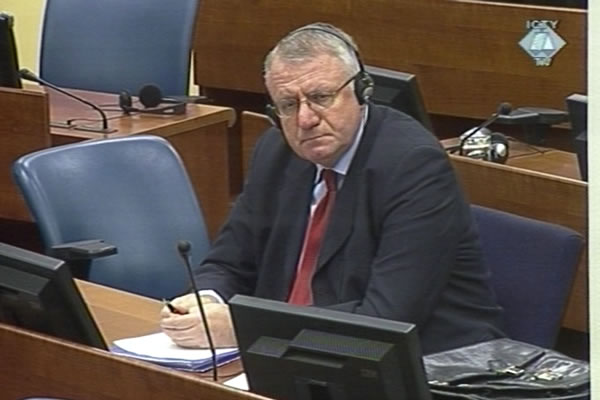Home
CHETNIK INSIDERS RECANT THEIR STATEMENTS
At the contempt of court trial, the Serbian Radicals’ leader started his case with the testimony of one of the 11 protected prosecution witnesses whose identity he made public in one of his books, as the indictment against him alleges. The witness claims he agreed to testify for the prosecution because he was ‘scared by the threats made by the OTP investigators’. After he changed his mind, the witness contacted Seselj’s defense and allowed the publication of the statements he gave to Seselj’s associates
 Vojislav Šešelj u sudnici Tribunala
Vojislav Šešelj u sudnici Tribunala On the first day of Seselj's defense case in his contempt of court trial, where he stands accused of disclosing the identity of 11 protected prosecution witnesses, Vojislav Seselj tried to prove that he had their ‘explicit consent’ to make their identities known to the public.
Testifying under the pseudonym DS-1, former police officer from Subotica who was also a member and a volunteer of the Serbian Radical Party, said that he got in touch with the OTP investigators in 2002. The witness gave them two statements in which he said that Seselj ordered that Muslims be killed in Skelani and that an explosive device was activated in the cathedral in Subotica on Seselj’s orders. In 2004, the witness testified at the trial of Slobodan Milosevic where he talked about those and other events. Today the witness claimed his statements and testimony were false. He gave them after the OTP investigators and prosecutors threatened that he would be prosecuted in The Hague for crimes he committed in the battlefields in Croatia and BH.
At that time, the witness started complaining to the investigators about the threats to his safety in Serbia and spent 18 months in Holland. He was then transferred to Norway. In 2005, the witness returned to Serbia. Three years later the witness contacted Seselj’s associates and gave them statements they could use for Seselj’s defense. When the accused asked the witness if he had given his consent for the publication of his statements in one of Seselj’s books, the witness confirmed he had.
In the examination-in chief, Seselj mainly focused on the issue of medical care the witness had received during his stay in The Hague, where he was treated for heart complaints, received neurological and dental care, and even had acupuncture treatments. As Seselj explained, the purpose of this line of examination was to show that the prosecution witnesses enjoy ‘privileged medical treatment’, unlike the accused in the detention unit who do not receive adequate medical care. Judge Morrison warned the accused that this issue was ‘not relevant at all’ for his contempt of court case. Seselj was also warned several times not to lead the witness.
Prosecutor amicus curiae Bruce MacFarlane asked the witness in the cross-examination why he had waited so long to complain to the defense or anyone else about the alleged pressure from the prosecution. Several years had passed from the witness’s last contact with the investigators and his subsequent return from Norway to Serbia and his meeting with Seselj’s associates. As the witness explained, he had to ‘calm down a bit’ when he returned, and after that he had serious health problems. Though the witness said that he was unable to resist the OTP pressure when he agreed to give his statements to the investigators ‘under threat’, at the same time he resolutely claimed he now wanted to testify only in Seselj’s defense, saying he ‘would dismiss any threat’ and attempts to sway him to do otherwise.
The next defense witness to take the stand was Zoran Drazilovic, former deputy chief of the War Staff of the Serbian Radical Party. He will complete his evidence tomorrow.
Linked Reports
- Case : Contempt
- 2011-05-24 SESELJ CHARGED WITH CONTEMPT OF COURT FOR THE THIRD TIME
- 2011-02-18 INDICTMENT AGAINST BERKO ZECEVIC SUSPENDED
- 2011-02-16 UNUSUAL CASE OF BERKO ZECEVIC
- 2011-06-07 PARADE OF CHETNIK INSIDERS WHO HAVE HAD ‘A CHANGE OF HEART’
- 2011-06-08 PROSECUTOR CALLS FOR THREE YEARS IN PRISON, SESELJ WISHES FOR A DEATHS SENTENCE
- 2011-07-06 SESELJ PLEADED ‘NOT GUILTY’ ON THIRD CONTEMPT OF COURT INDICTMENT
